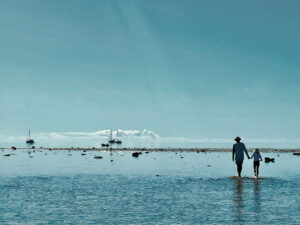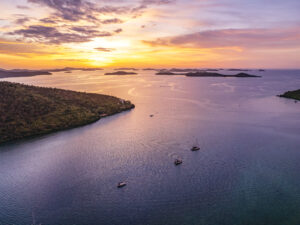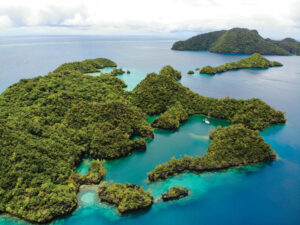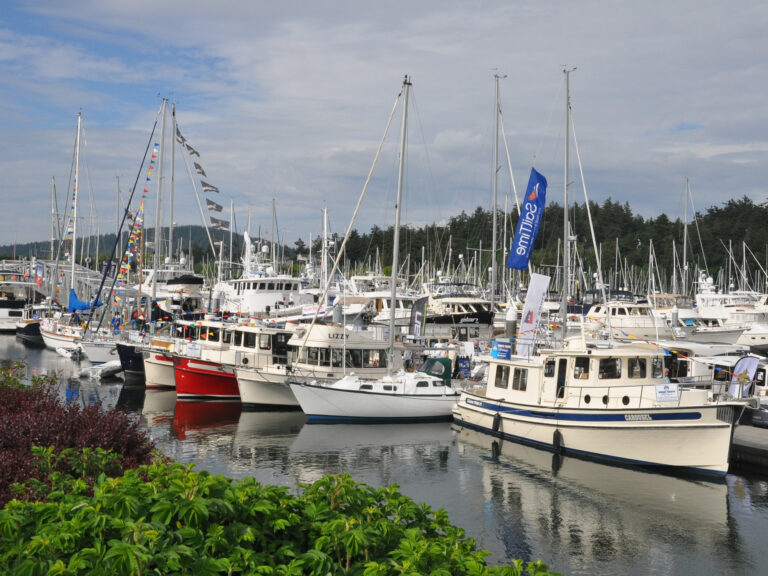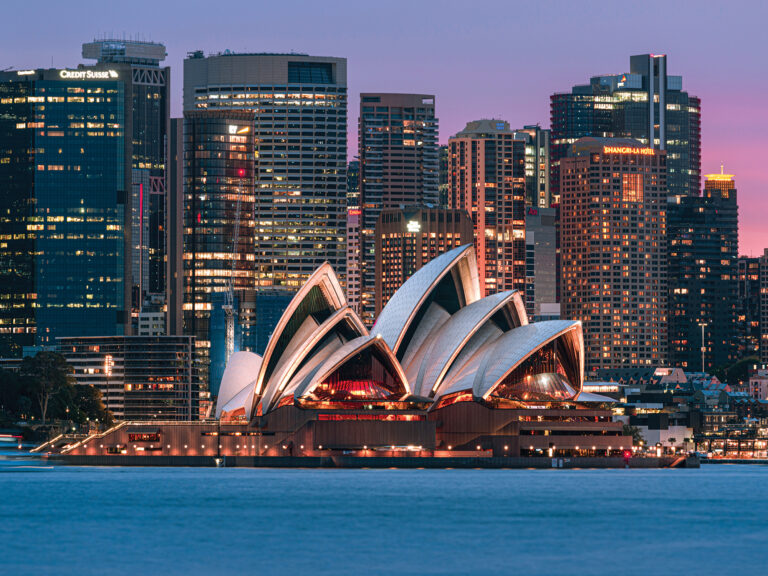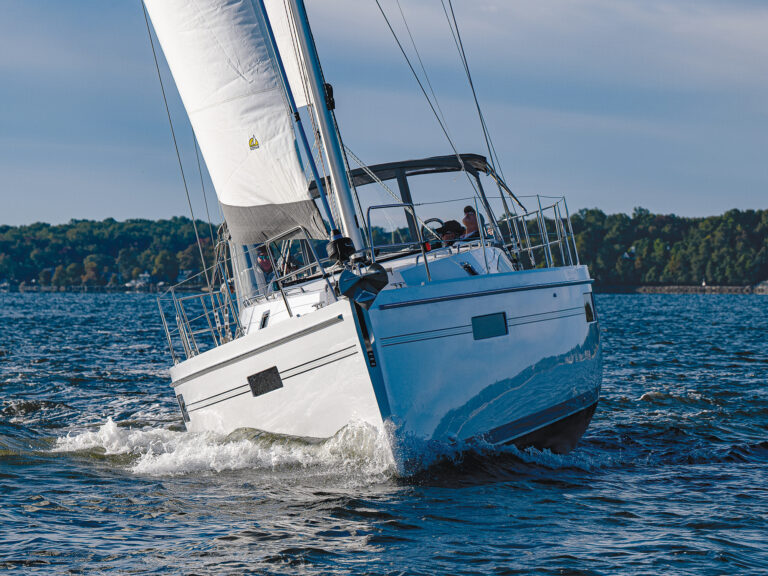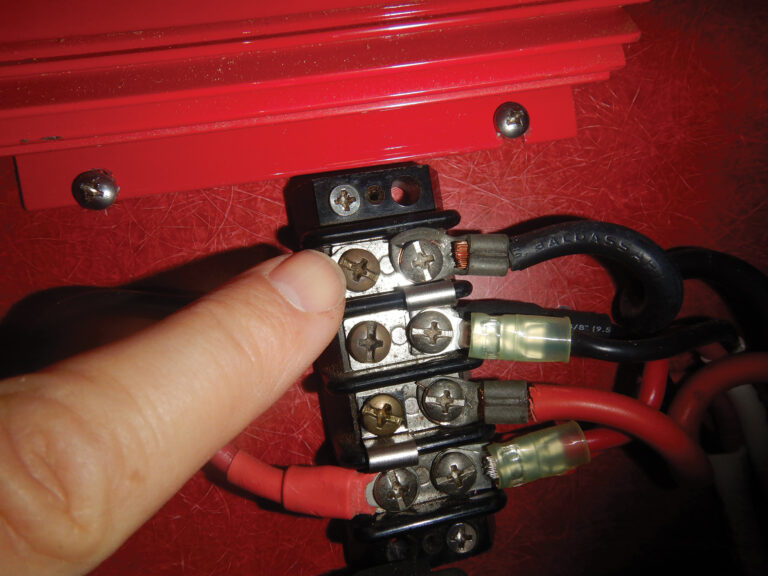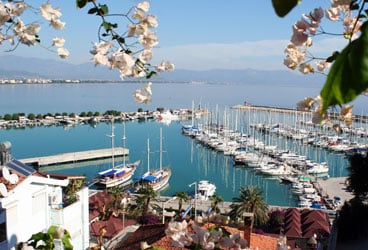
Turkey Marina
I like to write about what’s new and exciting—and for the crew of Wild Card, that’s marina life, Euro style. My wife, Carolyn, and I are currently wintering aboard our modest, 38-foot sloop in the 350-vessel Setur Finike Marina, on Turkey’s south coast.
Why winter in Turkey rather than Greece or southern Italy?
The primary reason is that Turkey is a wonderful, dynamic, fast-growing country with a robust economy and friendly people. It’s both convenient and cheap. Best of all is the benign microclimate around Finike, where oranges and sunshine abound.
The secondary reason is that Turkey is the only realistic winter option for non-European Union residents cruising in the Med on a tight budget. (Croatia’s skyrocketing costs and growing corruption make it far less yacht friendly.) Because of the recent Schengen Visa regulations (for information on the 25 participating European countries and the visa, visit ), we Americans can’t stay in the European Union for longer than 90 days out of any six-month period, and our boat can’t stay in E.U. waters for longer than 18 months without paying a V.A.T. Needless to say, this makes the logistics of cruising in the Med rather difficult. Turkey, affiliated with neither the E.U. nor Schengen, is a bit of sanity in this bureaucratic anti-visitor madness. The country welcomes foreign sailors with open arms.
Full-disclosure: I’m not a big fan of marinas. In my 50-plus years of living aboard, only about 10 of them have been in marina environments. I much prefer the freedom and convenience (in our eyes, at least) of living on the hook. We don’t have any shoreside electrical devices—hell, we don’t even have a shoreside electrical system aboard Wild Card.
However, the trick in life isn’t to go through it demanding your way—but rather adapting to the reality of the changing situation. It gets cold here during the winter. It also gets windy. Breakwaters are fine things under such circumstance. Ditto for sturdy docks with dependable electricity for glowing cabin heaters.
The nicest part: the Finike marina is in the heart of a very quaint farming village of 11,200 people. We’re only minutes away from the friendly baker, the beaming butcher, and the bustling pastry shop. There’s no tourism. The preferred method of local transportation is still the manure-smeared tractor. There’s no crime, and there’s no need for an alarm clock—the predawn muezzin’s song from the waterfront mosque takes care of that. Things are still very laid-back here. The local hardware stores keep trying to sell me fencing wire, field sickles, and post-hole diggers, not items we’re usually in great need of aboard Wild Card.
The local hardworking Turks are friendly, but still, you have to count your change. Their narrow worldview is that you have so much and they have so little that some impromptu wealth redistribution is in order. This normally translates to an additional lira or two being “mistakenly” added to your bill, seldom more if you keep your eyes open. In addition, many goods and services are very reasonably-priced. Thus, Turkey is still considered a true bargain by American and European standards.
The marina is relatively First World and charges for dock space the equivalent of US$315 per month for a six-month stay; it’s less for a year-round agreement. Since this price includes electricity to run electric heaters in the winter, and there are zero hidden charges, this isn’t too bad.
The marina’s social fabric is quite interesting. Many residents are German, with an almost equal number of French and British. We’re the only American couple. There’s a smattering of Scandinavian boats. The largest minority is the Russians.
The French, English, and Germans are used to working together and have an easy camaraderie (despite some, ahem, underlying historical tensions). They always include a dash of self-deprecating humor in their dealings with the others, and things generally run very smoothly.
They sensibly tend to focus on where they agree, first and foremost, then use that as a springboard for compromise. The Europeans are wonderfully diplomatic and considerate. They have to be. For centuries, they’ve been sharing the same precious finite resources and have been “actively at peace with each other for over 50 continuous years now,” as one proud Berliner recently told me.
The Russians are the odd men out here. Many haven’t quite learned that with rights come responsibilities. They make little attempt to communicate or cooperate, and they love the vodka bottle. They’re either laughing uproariously or crying loudly. The women in particular seem to be almost Olympian in their crying.
Occasionally, they line the rails of their gleaming yachts at dawn while weeping pitifully. Any attempt to discover what they’re crying about elicits, first, an increase in tears, then naked aggression. So a word to the wise: A softly weeping Russian woman is far better than an angry one.
There’s a nicely heated clubhouse called the Porthole that serves as the marina’s community headquarters. It offers an open kitchen, refrigeration, library exchange, video room, bar, and teahouse. It has “scheduled” social and educational activities each morning, afternoon, and evening. If you like to begin your day with yoga and Pilates, this is the place to start. There are art lessons, music lessons, navigation lessons, and various other impromptu education opportunities galore. Monday night is DVD movie night on the big screen—Irving Johnson’s Around Cape Horn, chronicling his sail aboard Peking, was a recent hit. If you’re into darts, Saturday’s Pub Night is for you. (If you’re lucky, I’ll be playing a wallpaper gig while watching Carolyn drink up my profits.) Sunday afternoon is the barbecue and musical jamboree (often with six or eight guitarists). This list of social activities isn’t nearly complete: there’s quiz night, woodwinds, biking, hiking, running, walking, and climbing activities as well.
And the local yachties can be imaginative when it comes to wearing down a newcomer’s resistance to join: I missed the first group guitar session. When I did show up, Clive, the organizer, asked me if I wanted to teach. I refused. Without pausing, he asked if I’d cover for him while he went to the toilet. I said sure, of course. How was I to know he was returning to Wales for a five-week-long urination?
Thus I was duped into being the guitar-class leader without exactly volunteering. Damn, these Euro dudes are clever!
Topic Night is held whenever a boat crew wants to share cruising information, perhaps on sailing in certain waters or raising kids aboard or something technical, like aluminum-yacht maintenance. Maritime law for European sailors, Euro yacht taxation, and cruising the canals of Europe are also popular topics.
Plus, each month there’s at least one local cultural activity as well; the recent trip to attend an open-air performance of the opera Carmen in a 2,000-year-old amphitheater was particularly well attended. Ditto for the bus ride to the local rug makers.
All of the above activities are open to everyone. Most fliers and activity info sheets are printed in English, German, and French. It’s considered very bad manners to attempt to exclude anyone from doing anything for any reason.
Of course, there are times when the various groups get together and don’t want the hassle of making it fair and equitable for all—the French want to speak French, for instance—and thus they have their own little get-togethers outside the Porthole in the large open-air pavilion dining area.
At first we thought these “national” get-togethers were strictly off-limits to all foreigners. But we soon found this wasn’t exactly true. We discovered the French were particularly prone to flattery. After repeatedly passing by their scrumptious, candle-lit feasts, I decided to see if there was any way we could attempt to politely horn in. Saying “When you’re too old for Paris, you’re too old for life” almost worked. So did “When will the Internet learn that everything on the web must be translated into French?” Eventually, however, we found a direct route into any French person’s heart by asking, “How can the British eat that crap? Have you ever actually tasted what they consider, and I use this term loosely, their national cuisine? It tastes like chalk. Awful! I wouldn’t feed it to my poodle!”
Any self-respecting Frenchman will immediately make a space for you, graciously find you a chair, and offer you some of his escargot and foie gras, all smothered in garlic and sautéed mushrooms, of course.
The Germans are a bit tougher. Saying stuff like “The history of Germany is the history of Europe” helps to develop rapport, sure. So does repeating slogans like “While Germany pays, the rest of the E.U. plays!” And “Let’s get naked!” always earns a happy, clubby smile from these nudity-crazed folks.
The English are easy: If a Frenchman passes by, just mutter something about “And not one of them can brew a decent pint!” If, however, it’s a German strolling toward the communal toilets, try “When it comes to poetry and romance, they’re pretty good train engineers!”
I’m not sure about how to culturally butter up the Russians; I’d guess probably that some form of vodka-induced bilingual crying is required.
Did I mention the ease at which one can attend to one’s personal hygiene? The town’s large and luxurious traditional Turkish bath is only minutes from the marina. You can spend hours having your epidermis scrubbed into utter bliss for mere pennies. (“After all those baths and all that scrubbing,” Carolyn laments, “Fatty still comes back with a dirty mind!”)
Of course, nothing’s perfect. The harbor has two breakwaters, and both are occasionally used as lovers’ lanes. (The Muslims have sex about as often as the Christians; evidently, they just feel far worse about it afterward.) In any event, there’s a lot of backseat activity around the marina, and one old German duffer is frantically attempting to keep track of it. “And this city administrator brings a different girl down every night and has been doing so for 13 yeeeeaaaars!” he chants whenever given half a chance.
He doesn’t seem to understand that we’re poking fun at him as we ask, “Last Wednesday, did he fondle the right or left breast of the dark-haired one?”
“Front or backseat?” someone else asks.
In any event, the French dearly love me because each time I play “House of the Rising Sun” on guitar, I introduce it as a French hit made famous by the legendary Johnny Hallyday.
All joking aside, spending a winter here in the Finike marina is a little like getting a Turkish-hued cultural-sensitivity course in European history. These folks don’t demonize each other. They recognize their mutual humanness with mutual respect. They know that laughter is the best lubricant for almost anything. And they realize that nothing is truly a solution for one if it’s a problem for many.
World cruising is many different things to many different people. I often think of circumnavigating as piloting a watery movable classroom around the world. We’re currently attending Euro 101 in Turkey, and we’re having a ball while doing so.
_
The Goodlanders are scheduled to haul_ Wild Card_ in April, then head out for another summer of Mediterranean fun. Fatty’s latest book is Red Sea Run._

